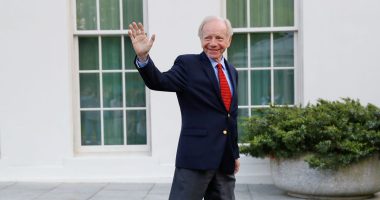Stay informed with free updates
Simply sign up to the World myFT Digest — delivered directly to your inbox.
This article is an on-site version of our FirstFT newsletter. Sign up to our Asia, Europe/Africa or Americas edition to get it sent straight to your inbox every weekday morning
Good morning. We kick off the week with news about Vladimir Putin’s victory in Russia’s presidential election. Early results from yesterday showed the Russian president on track to be re-elected with a majority of the vote and a significantly high voter turnout, according to the Russian electoral commission.
The outcome — which included totals from five Ukrainian regions occupied by Russia — was a foregone conclusion after the Kremlin outlawed all criticism of Putin or the war and blocked any opposition candidates from running.
Appearing eager to send a message to the west, Putin exuded confidence that Russia would win the war in Ukraine and said the high turnout showed that he enjoyed overwhelming public support to wage it.
The main challenges of his next six-year term, Putin said, were “achieving the goals of the special operation [in Ukraine] and strengthening our defence capacity and armed forces”. Read the full story.
Here’s what else I’m keeping tabs on today:
-
Economic data: The EU releases final February inflation data, while Rightmove publishes its monthly UK house price index.
-
Democracy summit: South Korea hosts the third iteration of the event, which runs until Wednesday, with attendees including US state secretary Antony Blinken.
-
Autonomy trial: Mike Lynch, once one of the UK’s most successful tech entrepreneurs, is set to go on trial over what US prosecutors have called “the largest fraud in the history” of Silicon Valley.
The FT and its research partner Statista are launching a project to identify the best companies to work for around the world. Nominate a “Best Employer” in the Asia-Pacific region with this simple online form (two minutes to complete). There’s more information here.
Five more top stories
1. Exclusive: The UK consulting market will fail to grow this year for the first time since 2020 as fears over the resilience of the economy, an upcoming election and geopolitical tensions prompt businesses to spend less on corporate advice. The retail, telecoms, pharmaceutical and manufacturing sectors are expected to cut spending on consultancies, putting pressure on an almost £16bn market that boomed in the two years after the pandemic.
2. Private equity is accelerating its pursuit of consultancies, talent agencies and accounting firms as it targets professional partnerships in one of the buyout industry’s last unconquered territories. Grant Thornton and Baker Tilly have agreed to sell majority stakes to private equity in the past six weeks, and bankers and executives expect more deals to come.
3. European banks must brace for rising insolvencies, greater geopolitical risks and upheaval in energy-intensive industries, the eurozone’s new chief banking supervisor has warned. Claudia Buch, who became chair of the European Central Bank’s supervisory arm in January, said an increase in the benchmark interest rate to a record high of 4 per cent “still has to filter its way through the financial system”. Read more from her interview with the Financial Times.
-
Suspended accounts scheme: Banks are clashing with the UK government over plans that would allow banks to transfer trapped funds to the government to finance its efforts to crack down on economic crime.
4. Exclusive: The US Federal Reserve will be forced to hold interest rates at a high level for longer than markets and central bankers anticipate, according to academic economists surveyed by the FT. The FT-Chicago Booth poll suggests the Fed will make up to two cuts this year, with the first taking place between July and September. Read more from the survey.
5. Benjamin Netanyahu has lashed out at sharp criticism from western allies of Israel’s strategy in Gaza, accusing them of seeking to orchestrate elections that would “paralyse” the country and lead to its defeat in the war against Hamas. The Israeli prime minister yesterday vowed to resist intensifying pressure to delay an offensive into the city of Rafah on the southern edge of the Gaza Strip.
-
Netanyahu’s American crisis: At a time when the country needs US support the most, Israel’s brazen leader has chosen to antagonise the White House, potentially putting that aid at risk.
Join the FT’s editor Roula Khalaf and colleagues on March 21 for a subscriber webinar on the Israel-Hamas war, fears of a wider conflict and the chance of a long-term settlement. Register now and put your questions to the panel.
The Big Read

Hindu litigants are mounting court challenges to allow them to worship at sites where India’s Muslim dynasties razed temples and built mosques. But for many of the country’s roughly 200mn Muslims, the wrangling over shared religious spaces is an intrusion on their rights by a government they see as promoting Hinduism above other religions. How the dispute plays out will shape religious discourse, social equanimity and the direction of secular democracy in the world’s most populous country.
We’re also reading . . .
-
UBS-Credit Suisse anniversary: A year on from UBS’s rescue of Credit Suisse, the merger’s success is becoming increasingly dependent on the performance of the Swiss bank’s wealth business.
-
UK economic reform: The bigger the challenges the UK faces in restoring its fortunes, the more timid its politicians seem to become, writes Martin Wolf, as he draws lessons from a cross-country study of successful transformation.
-
‘Loud quitting’: Videos of young workers resigning or being made redundant are going viral on social media sites such as TikTok as they wage a campaign for workplace transparency.
Chart of the day
Oceans have marked 365 straight days of record-breaking global sea surface temperatures, fuelling concerns that climate change could push marine ecosystems beyond a tipping point. Amplified by the cyclical El Niño weather phenomenon that warms the Pacific Ocean, this exceptional heat has bleak implications.

Take a break from the news
The first ships of Chinese immigrants arrived in what is now Vancouver in 1858, on the heels of British Columbia’s gold rush. Now, the Canadian city’s Chinatown is a flourishing destination to learn about Chinese heritage and culture. FT Globetrotter goes for a deep — and delicious — dive into the past and present of a storied neighbourhood.

Additional contributions from Benjamin Wilhelm
Read More: World News | Entertainment News | Celeb News
FT









